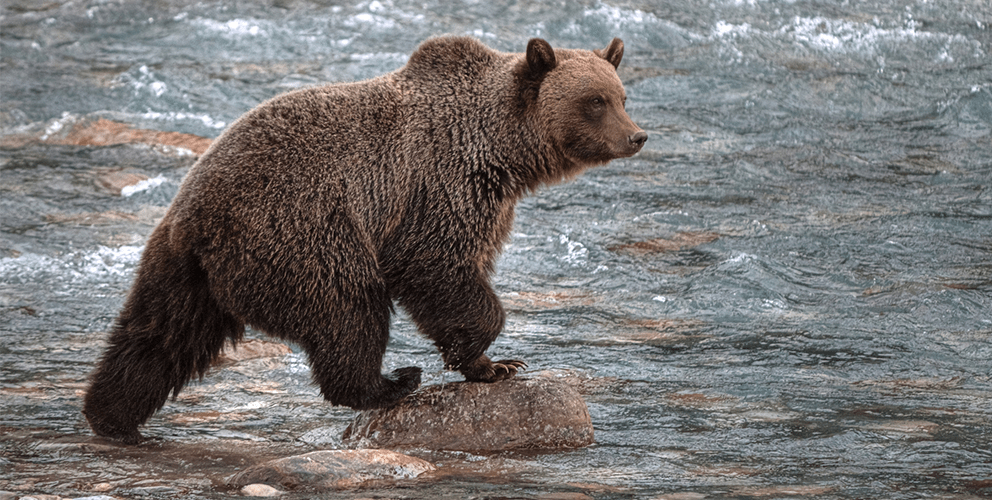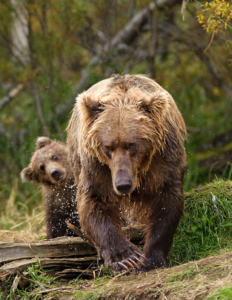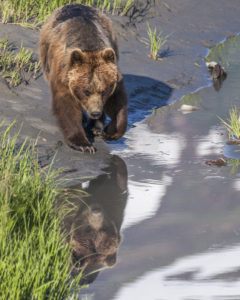We have much more to do and your continued support is needed now more than ever.
Fight Over Yellowstone Grizzlies
Lack of Trust Looms Large

A generation ago, Yellowstone grizzlies seemed on a path toward extinction, with the number of bears in and around the park estimated at fewer than 200 and declining. Today, with more than 700 grizzlies, the Greater Yellowstone Ecosystem is at or near carrying capacity for these magnificent animals, and we’re seeing grizzlies dispersing beyond Yellowstone to habitat where they haven’t been seen for decades.
All of the goals set for grizzly restoration in terms of numbers, population demographics and distribution have been met or exceeded.
Mission Accomplished?

The U.S. Fish and Wildlife Service stirred up intense controversy earlier this year when it proposed declaring “mission accomplished” and crossing Yellowstone grizzlies off the list of animals protected by the federal Endangered Species Act (ESA).
The ESA employs extraordinary measures to protect and conserve threatened and endangered species. To keep efforts moving, it makes sense to reduce conservation measures for recovering species so that we can focus on other imperiled wildlife in our country. But the proposal to “delist” Yellowstone grizzlies is controversial.
Some people don’t believe Yellowstone’s great bears are doing all that well. That’s a debatable, yet valid concern. Others, and this includes the National Wildlife Federation, acknowledge and celebrate the successful restoration of grizzlies, support delisting in concept, but have concerns about some of the nitty-gritty details involved in delisting. For us, it’s not whether grizzlies should be delisted but how. The “how” will determine the success of grizzly conservation from here on out.
Still other opposition boils down to trust – or the lack of it. Many people and organizations simply mistrust state agencies with the future of a once-imperiled species. States, of course, have primary jurisdiction in managing native wildlife. When a species is listed as threatened or endangered under the ESA, the U.S. Fish and Wildlife Service assumes primary authority over that species. When a species is delisted, the authority returns to the state or states.
Three states have a hand in managing Yellowstone-area grizzlies: Montana, Wyoming and Idaho.
Any fair assessment of the three wildlife-abundant states must acknowledge that they do a good job managing wild animals. Good but not perfect: Wyoming and Idaho have been less than hospitable to wolves, for example, and Montana has only recently stepped back from a decades-long war against bison. Overall, though, wildlife is plentiful and diverse in Montana, Wyoming and Idaho, and that’s no accident.
Hunting Dominates Discussion
The trust issue looms large in Yellowstone grizzly delisting, largely because of one issue: hunting.

Many wildlife advocates oppose grizzly hunting, period. Some are aghast at the prospect of opening hunting seasons on bears that spend part of their time in the National Park – where hunting is prohibited, but could become fair game if they step across an invisible boundary. Implicit in this opposition is a lack of trust that the states would adequately protect and conserve grizzlies. The hunting issue has become the most controversial aspect of Yellowstone grizzly delisting.
The issue was teed up late last year when Montana, Wyoming and Idaho wildlife authorities drafted an agreement outlining how much “discretionary mortality” of grizzlies could occur in the respective states following delisting. “Discretionary mortality” is defined as the amount of human-caused grizzly bear mortality over which agencies have discretionary authority, such as management removals and regulated harvest (hunting). Critics interpreted that agreement as eagerness to begin hunting grizzlies around Yellowstone as soon as possible.
Because overhunting could again threaten grizzly bears, the USFWS wanted the states to detail and commit to hunting regulations that would ensure against this. The ESA requires “adequate regulatory mechanisms” be in place to ensure the long-term survival of species before they can be delisted – another example of the trust issue that’s written into the law.
Montana, Wyoming and Idaho are now moving ahead with their grizzly hunting regulations. In doing so, they have greatly inflamed public concern about hunting Yellowstone grizzlies – and galvanized opposition to delisting.
States vs. USFWS
An interesting wrinkle is that the three states don’t want to establish grizzly-hunting seasons right now.
In a May 9 letter to the U.S. Fish and Wildlife Service, the heads of Montana, Wyoming and Idaho wildlife agencies complained that the government’s delisting proposal “appears to assume that all three states will establish (grizzly) hunting seasons. This assumption is premature, unnecessary and inappropriate.”
The state wildlife officials contend hunting is a management option the states may or may not consider after delisting, and that it should not be a condition of delisting.
Through all of this runs the matter of trust.
Look at how the states successfully manage wildlife in general, and you might find reason to trust they will do right by Yellowstone grizzlies. Look at how they have managed certain species, including wolves and bison, and you might be less than trusting. The ESA, for its part, suggests a trust-but-verify approach, anticipating a full handover of authority to the states but only with “adequate regulatory mechanisms” in place. For their part, the states are leery about the federal government overstepping its authority and interfering with states’ rights.
What’s Next
How will all this work out? It’s hard to say at this point. The comment period on the draft delisting rule ended in May, and another comment period on the next phase will likely be this fall at the earliest.
One prediction is that sooner or later, Yellowstone grizzlies will be delisted. Reaching this point, however, will take a lot of trust and a lot of work. But, grizzlies are worth the effort!
Help NowHelp NWF continue advocating for Yellowstone grizzlies!





















